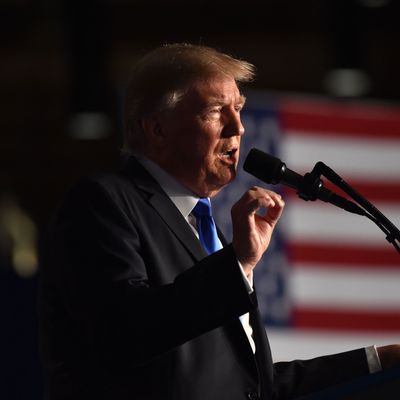
There is an eerie familiarity to President Trump’s position on deporting immigrants who came to the United States illegally as children. It contains the same mix of cruelty and desperate incompetence as his position on repealing Obamacare. There is the alternating of threats and bluster with sweet promises; the repeated delays in hopes a solution will somehow materialize; the lack of interest in programmatic detail (“administration officials privately expressed concern that Mr. Trump might not fully grasp the details of the steps he was about to take, and when he discovered their full impact, would change his mind,” reports the New York Times); and the final lurch into blame-avoidance that we are seeing now (“Congress, get ready to do your job - DACA!,” Trump demands, bluntly framing the policy as something Congress, not Trump, was supposed to have been working on these past seven and a half months.
On immigration, as on health care and other issues, anti-Obamaism has been the glue holding together the Republican coalition. Barack Obama cobbled together ungainly policy compromises as a way of working around the implacability of the Republican Party. Obama’s departure from the scene has dissolved the glue that held the Republican stance together, leaving Trump and his party flailing about for an alternative that is neither heretical to their own ideology nor overtly cruel.
Trump won his party’s nomination by outbidding all his rivals on ethno-nationalist appeal. This innovation was more a brilliant new discovery than Trump’s business technique of not paying contractors for services rendered. It was a short-term leverage play. Trump’s rivals knew perfectly well the power of white racial resentment in the Obama-era party. They held back because they, not he, were attempting to balance their appeal to the base with a viable plan that could appeal to the country as a whole.
It’s noteworthy that the policy Trump’s conventional Republican opponents attempted to articulate against him during the primary is essentially the one he has found his way toward now. Marco Rubio insisted that the Dreamers could not be deported right away, but that Obama’s refusal to deport them was an affront to the Constitution. “You already have people that have signed up for it. They’re working, they’re going to school. It would be deeply disruptive. But at some point, it has to come to an end,” he said at one point. “I will on my first day in office get rid of it because it’s unconstitutional,” he promised at another. Jeb Bush promised, “Let’s give them priority to be citizens. But by the law, not by decree, because that’s like a Latin American dictator.”
This was the Republican opposition to Obamacare all over again. It was vague enough to embrace both the most rigid ideological opponents of what Obama was attempting to do, as well as those who sympathized with his goal. What wrapped it all together was the insistence that Obama’s effrontery in bypassing Congress was the primary issue. Of course, Obama had enacted it because the Republicans Congress could not pass anything. Just how a Republican president might overcome this obstacle was never worked out.
Presented with the task of resolving the contradiction, Trump began backtracking on his stance almost immediately after the election. “We’re going to work something out that’s going to make people happy and proud … They got brought here at a very young age, they’ve worked here, they’ve gone to school here. Some were good students. Some have wonderful jobs. And they’re in never-never land because they don’t know what’s going to happen,” Trump told Time magazine in December. The Dreamers “shouldn’t be very worried,” because Trump was “going to take care of everybody … I do have a big heart,” he insisted in January. The president reiterated the theme at a press conference the following month: “We’re going to show great heart,” the president promised. “DACA is a very, very difficult subject for me … You have these incredible kids, in many cases … They were brought here … We are going to deal with DACA with heart … because, you know, I love these kids. I love kids! I have kids and grandkids.”
Trump was reprising his method on health care, right down to the terms themselves (“heart”; “take care of everybody.”) Of course, this presumed there was a way to take care of everybody while still satisfying the bloodlust of the conservative base. Some Republicans have floated the possibility of trading a solution for the Dreamers for a down payment on construction of Trump’s cherished border wall. Democrats and arch restrictionists alike oppose that deal.
Trump dispatched Jeff Sessions, his arch-restrictionist attorney general, to defend his policy — or, at least, a policy. Sessions articulated a case that would seem to rule out any mercy whatsoever for children who had crossed the border illegally. “To have a lawful system of immigration that serves the national interest, we cannot admit everyone who would like to come here,” he said. “That is an open border policy and the American people have rightly rejected it.” Trump published his own statement emphasizing the rule of law and the necessity of legislation, but also contradicting Sessions’s belief that the rule of law requires the Dreamers to be deported. “I do not favor punishing children, most of whom are now adults, for the actions of their parents,” Trump writes.
Access to power is exposing the hollowness of the Republican platform. The chronically leaky administration has fatally undercut any pretense of coherence in the president’s announcement. Trump made his announcement because he wants “a way out,” reports the Times. If Congress fails to act, a scenario that seems likely, a senior aide told Politico, “he didn’t expect Trump to follow through on terminating DACA.” If there is any saving grace to the situation, it is that, contra Yeats, the worst lack all conviction.






























